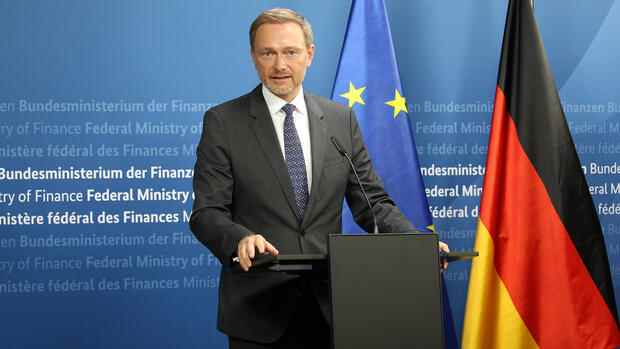Berlin Christian Lindner (FDP) had long considered whether he should fly to Jakarta to meet the finance ministers and central bank governors of the leading industrialized and emerging countries (G20). Like many of his colleagues, he decided against it because of the corona situation, so it remained to get to know each other virtually.
Corona was still one of the dominant topics in the talks between the finance ministers. In their final declaration, the G20 finance ministers stated that the global economy was recovering. But the paper also mentions a whole bundle of risks. Lindner said there are “significant downside risks” that could jeopardize the recovery of the global economy.
From the point of view of the G20, one risk is new waves of infection in the pandemic. These would slow down the economic recovery. Economists have been warning for some time that the omicron wave in China with its tough corona policy could lead to further lockdowns, which would then also weigh on the global economy.
While this point was undisputed, another was hotly debated. The final communiqué also mentions “geopolitical tensions” as a further risk for the global economy.
Top jobs of the day
Find the best jobs now and
be notified by email.
However, a previous draft referred to “current” geopolitical tensions, which would have been a clearer reference to the Ukraine conflict.
However, this passage was watered down at the urging of Russia and China. Unlike the G7 finance ministers of the leading industrial nations, the G20 did not send a clear warning to Russia in the Ukraine conflict. The West accuses Russia of preparing an invasion.
“The key to solving the conflict lies in Moscow”
Lindner emphasized that he had made it very clear in the meeting that the geopolitical tensions emanated from the situation in Eastern Europe. However, other finance ministers had a different opinion, which is why this was not included in the final declaration.
An escalation in Ukraine would above all be a tragedy for the people of Ukraine, said Lindner. Then there are economic considerations. In the event of an escalation, there would be no economic winners, and a crisis would escalate. “The key to solving the conflict lies in Moscow,” said Lindner.
The G20 countries see the significantly increased inflation as a further risk. The goal must be to make global supply chains more resilient, according to the final declaration.
Most of the reasons for the higher inflation are temporary, explained Lindner. But it is crucial “not to allow” higher inflation to “consolidate”. In order to prevent this, the central banks want to coordinate more closely internationally.
The final declaration will be published on Friday.
(Photo: AP)
The debt of many countries, which had climbed to record levels during the pandemic, was also discussed at the G20 meeting. Lindner emphasized: “We have to keep an eye on the debt.” It is important “to be guided by the principles of fiscal sustainability”.
All states would have to make efforts to have financial leeway in the next crisis. All G20 countries must also have a clear understanding that their own financial policies affect other countries. In the USA, for example, the recent high level of government spending led to a debate as to whether this would fuel inflation.
In the G20, Germany is committed to coordinating the financial policies of the G20 countries, said Lindner. Discussions were also being held about greater global transparency of debt. China in particular has been accused of concealing the true debts of regions or state-owned companies.
Many developing countries in dire straits
The G20 is particularly concerned about possible debt crises in poorer countries. According to the International Monetary Fund (IMF), around 60 percent of developing countries – mainly in Africa – are already in dire straits because of their debts or are acutely threatened by them.
According to calculations by the World Bank, 74 developing countries will have to repay a total of 35 billion dollars to their creditors this year – at a time when interest rates are rising again and financing costs are becoming more expensive, especially for riskier investments.
In the first two years of the Corona crisis, 2020 and 2021, all interest and principal payments were deferred in the poorest countries so that they have money to fight the pandemic. This aid has now expired.
During the crisis, the G20 countries had agreed on a framework for how cases should be dealt with in the future when entire countries are about to go bankrupt. However, many countries fear being punished on the capital market if they register for help under the so-called Common Framework.
In addition to these crisis issues, the G20 meetings wanted to send positive signals in the implementation of another planned major project: global tax reform. The goal of the federal government and the G20 is still to implement the reform as of January 1, 2023, said Lindner.
This schedule is considered very ambitious. The German industry association BDI emphasized this week that 2024 would make more sense in order to have enough time to prepare.
Almost 140 countries agreed on the tax reform last year under the umbrella of the Organization of Industrialized Nations (OECD). It provides for a minimum tax for international corporations of 15 percent and greater taxation of digital businesses. Likewise, emerging economies receive a higher share of the tax revenue from corporations that are not headquartered in the respective country but produce there on a large scale.
More: How Putin is challenging the West – and why he could be successful with it
